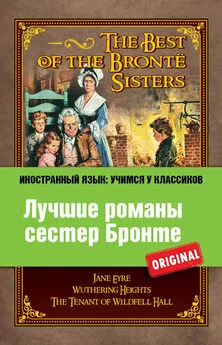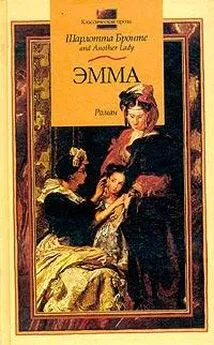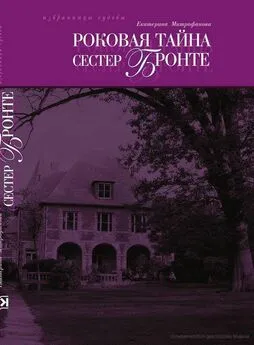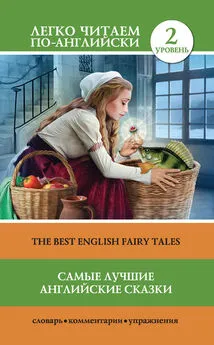Шарлотта Бронте - Лучшие романы сестер Бронте / The best of the Brontë sisters
- Название:Лучшие романы сестер Бронте / The best of the Brontë sisters
- Автор:
- Жанр:
- Издательство:Литагент «Эксмо»334eb225-f845-102a-9d2a-1f07c3bd69d8
- Год:2013
- Город:Москва
- ISBN:978-5-699-61892-7
- Рейтинг:
- Избранное:Добавить в избранное
-
Отзывы:
-
Ваша оценка:
Шарлотта Бронте - Лучшие романы сестер Бронте / The best of the Brontë sisters краткое содержание
«Иностранный язык: учимся у классиков» – это только оригинальные тексты лучших произведений мировой литературы. Эти книги станут эффективным и увлекательным пособием для изучающих иностранный язык на хорошем «продолжающем» и «продвинутом» уровне. Они помогут эффективно расширить словарный запас, подскажут, где и как правильно употреблять устойчивые выражения и грамматические конструкции, просто подарят радость от чтения. В конце книги дана краткая информация о культуроведческих, страноведческих, исторических и географических реалиях описываемого периода, которая поможет лучше ориентироваться в тексте произведения.
Серия «Иностранный язык: учимся у классиков» адресована широкому кругу читателей, хорошо владеющих английским языком и стремящихся к его совершенствованию.
Лучшие романы сестер Бронте / The best of the Brontë sisters - читать онлайн бесплатно ознакомительный отрывок
Интервал:
Закладка:
‘Because I wished to destroy it,’ I answered, with an asperity it is useless now to lament.
‘Oh, very good!’ was the reply; ‘if you don’t value me, I must turn to somebody that will.’
I thought it was partly in jest – a half-playful mixture of mock resignation and pretended indifference: but immediately he resumed his place beside Miss Wilmot, and from that hour to this – during all that evening, and all the next day, and the next, and the next, and all this morning (the 22nd), he has never given me one kind word or one pleasant look – never spoken to me, but from pure necessity – never glanced towards me but with a cold, unfriendly look I thought him quite incapable of assuming.
My aunt observes the change, and though she has not inquired the cause or made any remark to me on the subject, I see it gives her pleasure. Miss Wilmot observes it, too, and triumphantly ascribes it to her own superior charms and blandishments; but I am truly miserable – more so than I like to acknowledge to myself. Pride refuses to aid me. It has brought me into the scrape, and will not help me out of it.
He meant no harm – it was only his joyous, playful spirit; and I, by my acrimonious resentment – so serious, so disproportioned to the offence – have so wounded his feelings, so deeply offended him, that I fear he will never forgive me – and all for a mere jest! He thinks I dislike him, and he must continue to think so. I must lose him for ever, and Annabella may win him, and triumph as she will.
But it is not my loss nor her triumph that I deplore so greatly as the wreck of my fond hopes for his advantage, and her unworthiness of his affection, and the injury he will do himself by trusting his happiness to her. She does not love him: she thinks only of herself. She cannot appreciate the good that is in him: she will neither see it, nor value it, nor cherish it. She will neither deplore his faults nor attempt their amendment, but rather aggravate them by her own. And I doubt whether she will not deceive him after all. I see she is playing double between him and Lord Lowborough, and while she amuses herself with the lively Huntingdon, she tries her utmost to enslave his moody friend; and should she succeed in bringing both to her feet, the fascinating commoner will have but little chance against the lordly peer. If he observes her artful by-play, it gives him no uneasiness, but rather adds new zest to his diversion by opposing a stimulating check to his otherwise too easy conquest.
Messrs. Wilmot and Boarham have severally taken occasion by his neglect of me to renew their advances; and if I were like Annabella and some others I should take advantage of their perseverance to endeavour to pique him into a revival of affection; but, justice and honesty apart, I could not bear to do it. I am annoyed enough by their present persecutions without encouraging them further; and even if I did it would have precious little effect upon him. He sees me suffering under the condescending attentions and prosaic discourses of the one, and the repulsive obtrusions of the other, without so much as a shadow of commiseration for me, or resentment against my tormentors. He never could have loved me, or he would not have resigned me so willingly, and he would not go on talking to everybody else so cheerfully as he does – laughing and jesting with Lord Lowborough and my uncle, teasing Milicent Hargrave, and flirting with Annabella Wilmot – as if nothing were on his mind. Oh! why can’t I hate him? I must be infatuated, or I should scorn to regret him as I do. But I must rally all the powers I have remaining, and try to tear him from my heart. There goes the dinner-bell, and here comes my aunt to scold me for sitting here at my desk all day, instead of staying with the company: wish the company were – gone.
Chapter XIX
Twenty Second: Night. – What have I done? and what will be the end of it? I cannot calmly reflect upon it; I cannot sleep. I must have recourse to my diary again; I will commit it to paper to-night, and see what I shall think of it to-morrow.
I went down to dinner resolving to be cheerful and well-conducted, and kept my resolution very creditably, considering how my head ached and how internally wretched I felt. I don’t know what is come over me of late; my very energies, both mental and physical, must be strangely impaired, or I should not have acted so weakly in many respects as I have done; but I have not been well this last day or two. I suppose it is with sleeping and eating so little, and thinking so much, and being so continually out of humour. But to return. I was exerting myself to sing and play for the amusement, and at the request, of my aunt and Milicent, before the gentlemen came into the drawing-room (Miss Wilmot never likes to waste her musical efforts on ladies’ ears alone). Milicent had asked for a little Scotch song, and I was just in the middle of it when they entered. The first thing Mr. Huntingdon did was to walk up to Annabella.
‘Now, Miss Wilmot, won’t you give us some music to-night?’ said he. ‘Do now! I know you will, when I tell you that I have been hungering and thirsting all day for the sound of your voice. Come! the piano’s vacant.’
It was, for I had quitted it immediately upon hearing his petition. Had I been endowed with a proper degree of self-possession, I should have turned to the lady myself, and cheerfully joined my entreaties to his, whereby I should have disappointed his expectations, if the affront had been purposely given, or made him sensible of the wrong, if it had only arisen from thoughtlessness; but I felt it too deeply to do anything but rise from the music-stool, and throw myself back on the sofa, suppressing with difficulty the audible expression of the bitterness I felt within. I knew Annabella’s musical talents were superior to mine, but that was no reason why I should be treated as a perfect nonentity. The time and the manner of his asking her appeared like a gratuitous insult to me; and I could have wept with pure vexation.
Meantime, she exultingly seated herself at the piano, and favoured him with two of his favourite songs, in such superior style that even I soon lost my anger in admiration, and listened with a sort of gloomy pleasure to the skilful modulations of her full-toned and powerful voice, so judiciously aided by her rounded and spirited touch; and while my ears drank in the sound, my eyes rested on the face of her principal auditor, and derived an equal or superior delight from the contemplation of his speaking countenance, as he stood beside her – that eye and brow lighted up with keen enthusiasm, and that sweet smile passing and appearing like gleams of sunshine on an April day. No wonder he should hunger and thirst to hear her sing. I now forgave him from my heart his reckless slight of me, and I felt ashamed at my pettish resentment of such a trifle – ashamed too of those bitter envious pangs that gnawed my inmost heart, in spite of all this admiration and delight.
‘There now,’ said she, playfully running her fingers over the keys when she had concluded the second song. ‘What shall I give you next?’
But in saying this she looked back at Lord Lowborough, who was standing a little behind, leaning against the back of a chair, an attentive listener, too, experiencing, to judge by his countenance, much the same feelings of mingled pleasure and sadness as I did. But the look she gave him plainly said, ‘Do you choose for me now: I have done enough for him, and will gladly exert myself to gratify you;’ and thus encouraged, his lordship came forward, and turning over the music, presently set before her a little song that I had noticed before, and read more than once, with an interest arising from the circumstance of my connecting it in my mind with the reigning tyrant of my thoughts. And now, with my nerves already excited and half unstrung, I could not hear those words so sweetly warbled forth without some symptoms of emotion I was not able to suppress. Tears rose unbidden to my eyes, and I buried my face in the sofa-pillow that they might flow unseen while I listened. The air was simple, sweet, and sad. It is still running in my head, and so are the words: –
Farewell to thee! but not farewell
To all my fondest thoughts of thee:
Within my heart they still shall dwell;
And they shall cheer and comfort me.
O beautiful, and full of grace!
If thou hadst never met mine eye,
I had not dreamed a living face
Could fancied charms so far outvie.
If I may ne’er behold again
That form and face so dear to me,
Nor hear thy voice, still would I fain
Preserve, for aye, their memory.
That voice, the magic of whose tone
Can wake an echo in my breast,
Creating feelings that, alone,
Can make my tranced spirit blest.
That laughing eye, whose sunny beam
My memory would not cherish less; –
And oh, that smile! I whose joyous gleam
No mortal languish can express.
Adieu! but let me cherish, still,
The hope with which I cannot part.
Contempt may wound, and coldness chill,
But still it lingers in my heart.
And who can tell but Heaven, at last,
May answer all my thousand prayers,
And bid the future pay the past
With joy for anguish, smiles for tears.
When it ceased, I longed for nothing so much as to be out of the room. The sofa was not far from the door, but I did not dare to raise my head, for I knew Mr. Huntingdon was standing near me, and I knew by the sound of his voice, as he spoke in answer to some remark of Lord Lowborough’s, that his face was turned towards me. Perhaps a half-suppressed sob had caught his ear, and caused him to look round – heaven forbid! But with a violent effort, I checked all further signs of weakness, dried my tears, and, when I thought he had turned away again, rose, and instantly left the apartment, taking refuge in my favourite resort, the library.
There was no light there but the faint red glow of the neglected fire; – but I did not want a light; I only wanted to indulge my thoughts, unnoticed and undisturbed; and sitting down on a low stool before the easy-chair, I sunk my head upon its cushioned seat, and thought, and thought, until the tears gushed out again, and I wept like any child. Presently, however, the door was gently opened and someone entered the room. I trusted it was only a servant, and did not stir. The door was closed again – but I was not alone; a hand gently touched my shoulder, and a voice said, softly, – ‘Helen, what is the matter?’
I could not answer at the moment.
‘You must, and shall tell me,’ was added, more vehemently, and the speaker threw himself on his knees beside me on the rug, and forcibly possessed himself of my hand; but I hastily caught it away, and replied, – ‘It is nothing to you, Mr. Huntingdon.’
‘Are you sure it is nothing to me?’ he returned; ‘can you swear that you were not thinking of me while you wept?’ This was unendurable. I made an effort to rise, but he was kneeling on my dress.
‘Tell me,’ continued he – ‘I want to know, – because if you were, I have something to say to you, – and if not, I’ll go.’
‘Go then!’ I cried; but, fearing he would obey too well, and never come again, I hastily added – ‘Or say what you have to say, and have done with it!’
‘But which?’ said he – ‘for I shall only say it if you really were thinking of me. So tell me, Helen.’
‘You’re excessively impertinent, Mr. Huntingdon!’
Читать дальшеИнтервал:
Закладка:










